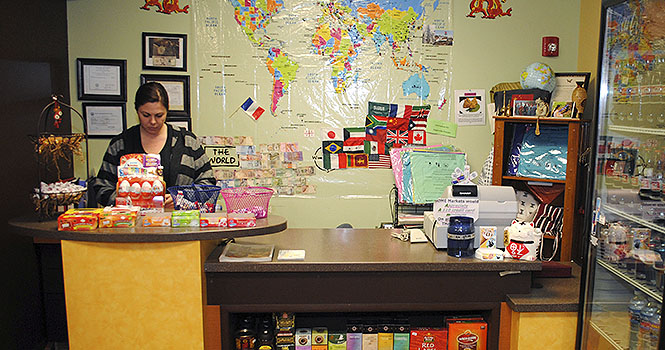Students start businesses before they graduate
Colleen Belan works an evening shift at the International HOME Market in Acorn Alley on Tuesday, Nov. 27. Belan has been an employee there for about 10 months. The market is a student run business that has been successful through the Kent State entrepreneurship program. The market offers a variety of food and snacks from different cultures, and has been in business for about two years. Photo by Jenna Watson.
December 4, 2012
Kent State’s entrepreneurship program is unique because every student majoring in entrepreneurship is required to launch and run a business in an experiences course.
“I think the most unique aspect of our program is the way in which we integrate entrepreneurs in the community into our program,” said Pam Grimm, chair of the Department of Marketing and Entrepreneurship.
The majority of Kent State’s entrepreneurship faculty and instructors bring their personal experiences as past and present business owners to the program. Entrepreneurs-in-residence are on hand to assist student entrepreneurs.
“Someone who hasn’t actually started a business will struggle,” said entrepreneurship instructor Denise Easterling. “That’s why they hired us. … You can read about businesses, but you need someone to mentor you along the way in order to be successful.”
Four business endeavors prior to graduation
Chad Radke started his first business, Oasis Marketing Events, in Entrepreneurship Experiences. The goal of Oasis was to provide small businesses with marketing materials and event-planning services.
Radke is now focused on shutting down Oasis Marketing. He is the chief executive officer of student-run Laundry in a Flash.
He became CEO of the business, which got its start in 2009 in the experiences class, after the original owner graduated.
Radke also has participated in a couple of entrepreneurship competitions where students come up with products or businesses and pitch ideas.
His first idea was Fresh Scent Surgical Mask, which he created with nursing major Breana Jacobs. They took their idea to Hiram College’s Entrepreneurship Education Consortium’s ideaLabs competition and won a $1,000 prize for third place.
The next competition was the annual Entrepreneurship Immersion Week hosted by Case Western University. Radke and four other students won first place and a prize of $2,500 for their software-program idea, called Quick OR. The software aims to make surgery more efficient and have the best outcome possible by better prepping surgeons and nurses for operations.
“Two years ago, I would’ve never thought I would have won two business competitions, have started a business and have two businesses laying low that I could possibly pursue,” Radke said.
Expanding international food store to other college campuses
Genia Kollie, co-owner of International HOME Markets, knows exactly what she wants to accomplish as an entrepreneur. She wants to expand her international food store to other college campuses, such as John Carroll University and The Ohio State University.
Long before Kollie knew she would be an entrepreneurship major, she dreamed of owning her own business. She took an introductory business course to fill her schedule. Kollie took the class with Easterling and fell in love with the class, concepts and ideas.
“Getting introduced to entrepreneurship program in the Intro to Entrepreneurship class actually lit the passion and the fire for me to actually continue to fulfill my dream,” Kollie said.
Kollie eventually won a pitch competition for a storefront owned by Kent State in Acorn Alley. Her business will be a permanent tenant.
The business already expanded its selection from when it started but is slated to continue its growth. When the store opened, there were 50 items on the shelves. There are now more than 700 items.
Co-owners of Snapcessories look to expand their product selection
Rachel O’Neill, Jennah Sufayyan and Tara Bresette, co-owners of Snapcessories, also hope to expand their product selection. They currently sell interchangeable hair accessories that change bows and flowers on a lace headband with a magnetic snap.
The business also started in Entrepreneurship Experiences. O’Neill thought of the idea on her way to pitch a different idea to her class.
“When I pitched my idea, about half the class raised their hand and thought it was a good idea and half didn’t,” O’Neill said. “It was OK because part of the entrepreneurship program [is] they teach that it doesn’t matter. If you know it’s a good idea, someone else could think it’s the stupidest idea ever. But some of those ideas have made millions of dollars.”
Snapcessories employs Indian refugee women through the Shangri-La branch of SEWA International in Akron. SEWA, a word in Sanskrit that translates to “service above self,” strives to serve distressed people, aid local communities and promote volunteering.
The Snapcessories website recently launched and made its first sale to a woman in Maryland the first day it was in service.
“I like building things and [knowing] that I was a part of it. So, starting something from the ground up, I think it’s fun,” O’Neill said. “We have fun together, even just cutting fabric.”
But the best part about it, she said, is seeing Snapcessories grow.
Contact Mary Kate Garvey at [email protected].

























